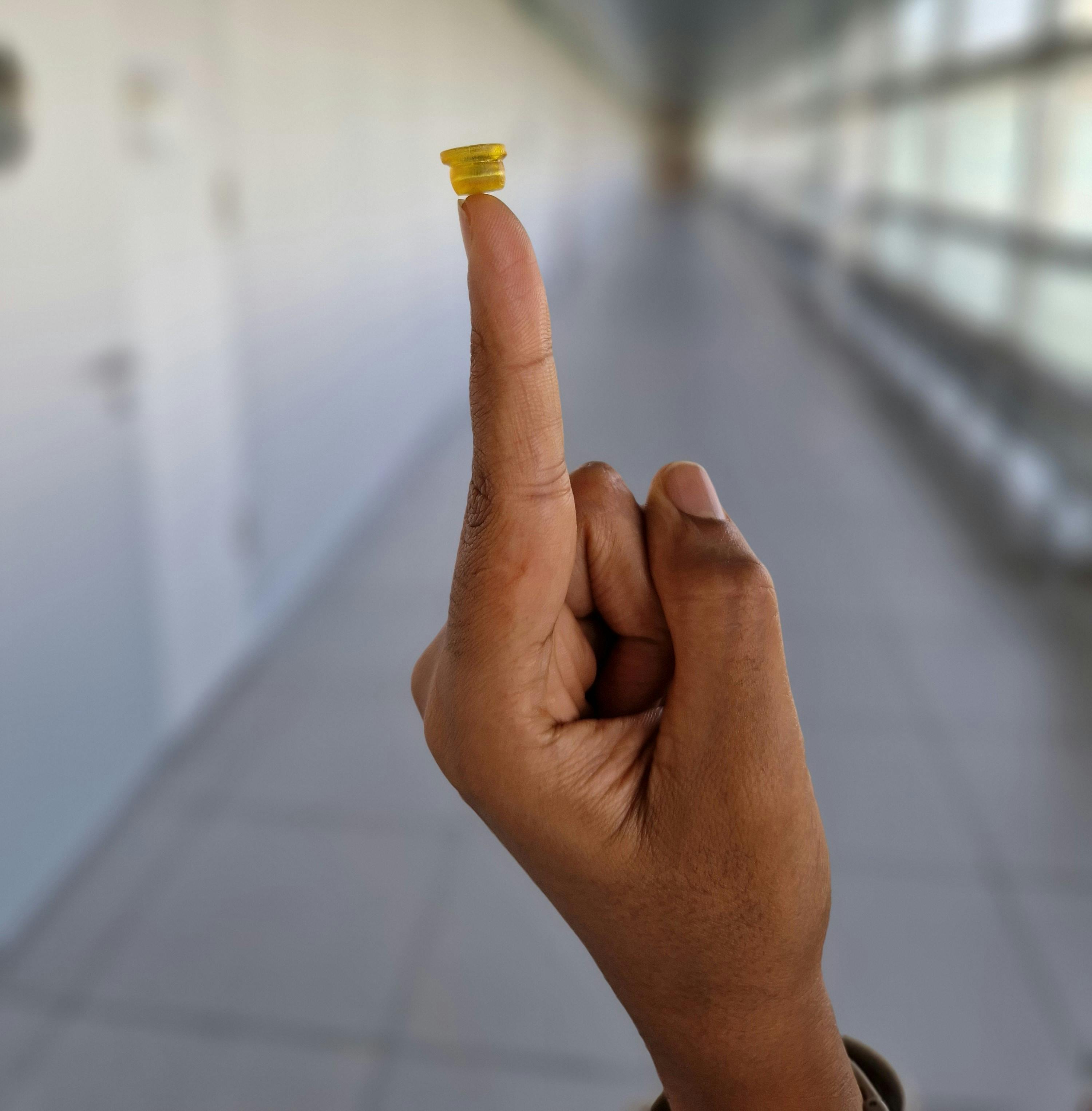
Ms. Paunović, you and David Klein Cerrejon came up with a business idea while studying for your doctorate.
Paunović: As part of our doctorates, David and I both did research with Professor Jean-Christophe Leroux at ETH Zurich, who was working on the development of drug delivery systems. Certain medicines, including proteins and peptides, are poorly absorbed via the gastrointestinal tract, so need to be taken by subcutaneous injection. This is a considerable nuisance for many millions of patients when it comes to administration. There’s a real demand for alternative solutions.
How did you come up with the idea of administering medication via the buccal mucosa?
Paunović: It’s a funny story actually. During a hot pot dinner party with friends, one of our post-doc students got half a Szechuan peppercorn stuck on the inside of his cheek, and he could feel the heat of the pepper starting to penetrate his cheek. This gave him the idea for the suction cup.
Klein Cerrejon: Within the team, we developed a prototype that attaches itself to the inside of the cheek and transports medication into the circulation via the mucosa. The suction cup is like those you find on an octopus. It remains in place thanks to vacuum pressure and is easy to use. We had the OctoPatch patented in 2021 and have since done lots of tests on animal tissue. A trial run with 40 volunteers, without using any medication, was successful, and over 80% of the participants preferred using a suction cup to a syringe.
Where do you see a market for the OctoPatch?
Paunović: The suction cup could be used to administer medications to treat type 2 diabetes, obesity, osteoporosis, and prostate cancer. We’re currently focusing on clinical development with semaglutide, which is used to treat type 2 diabetes and aid weight loss. We’d also like to collaborate with pharmaceutical companies with a view to offering pain-free and needle-free alternatives for new medications. So-called therapeutic peptides, which currently generate annual sales of around 40 billion francs, are particularly interesting.
From the lab to the real world: How is the OctoPatch manufactured and used?
Klein Cerrejon: We produced the first prototypes on a 3D printer. For final production purposes, we are using an injection molding process with silicone. The OctoPatch reduces waste compared with syringes, and we’re working on a fully biodegradable version.
Paunović: Once we’re ready for market, patients will get the suction cup in a blister pack, a bit like a tablet. They just need to place it against the inside of their cheek and briefly compress it with two fingers. It remains in place thanks to vacuum pressure and can be removed after 10-30 minutes. The medication enters the blood stream directly, so there’s no need for any complex dosing instructions, such as taking something in the morning on an empty stomach or fasting for 30 minutes after taking it.
When did the idea of founding a spin-off come about?
Klein Cerrejon: The data from animal studies with the first prototype exceeded all our expectations. The idea of founding a spin-off based on my doctoral studies was an obvious one, particularly as I’d already helped to found an NGO and had experienced how much you can achieve if you have enough passion for what you’re doing. Nevena and I had already been working in the same office for over two years by this point, and once she came on board after completing her doctorate, we then took the first steps toward founding OBaris. Her experience in dealing with patients and her knowledge of barriers to entry in terms of medication and regulatory affairs complemented my own skills nicely, and together we made a great team.
Right from the initial phase of founding our spin-off, we’ve received help from Michio Painter and Liliane Brunner Halbach from what is currently known as the Translational Medicine Accelerator (TMA) at University Medicine Zurich. They know the industry inside out and have enormous know-how in relation to start-ups. Thanks to their expertise and wide-reaching network, they’ve helped us develop our strategy and find partners.
OBaris is now based at the BIO-TECHNOPARK in Schlieren, alongside 50 other companies and major industry players, such as Roche. We’re currently making final improvements to the product and securing funding for the first clinical studies. We’re really excited!

A pain-free alternative to injections that also generates less waste: the OctoPatch suction cup
Glossary
Peptide:
Peptides are small proteins. Their component parts consist of several amino acids connected via peptide bonds
Subcutaneous:
Under the skin
Spin-off:
A spin-off is where an organizational unit is separated off from an existing structure such as a university. A research group becomes a separate company once the foundation process is complete.
Contact
David Klein Cerrejon
Nevena Paunović
OBaris
Wagistrasse 18
8952 Schlieren
E-Mail
From research to marketability: Zurich offers ideal conditions for successful spin-offs
The founding of a spin-off typically involves a transition from pure research to commercialization, something that presents a considerable challenge. This process involves developing a marketable application or product based on the results of research. It includes aspects such as product development, market analysis, business modeling, financing, legal framework conditions, and setting up a fully operational business. These hurdles need to be cleared in order to turn a scientific idea into a successful commercial enterprise.
Targeted support improves competitiveness
To help close the gap between scientific research and use in practice, University Medicine Zurich (UMZH) is offering interested spin-offs an opportunity to improve their competitiveness with the Translational Medicine Accelerator (TMA.) If the development process receives professional support and is therefore accelerated, this can give medical innovations a better chance of succeeding on the market. The TMA offers tailored advice, business courses, and mentoring, and connects company founders with relevant parties from industry and also investors. The UZH Life Sciences Fund is particularly worthy of mention. This provides specific financial support for spin-offs to help them develop their business strategy and successfully scale up their projects.
The TMA has supported almost 100 projects over the past three years. An important role is also played by SPARK ZURICH, a mentoring network supported by the TMA, which is based on the successful program with the same name, run by Stanford University in the USA. Founder teams are able to present their projects and plans and benefit from feedback given by a range of external experts.
Zurich as a unique place for business and commerce
The city itself, as a location, offers ideal conditions for innovative life sciences companies that are looking to build a successful business. And as Switzerland’s business hub, the «Greater Zurich Area» certainly impresses with its high density of small biotech companies, established industry partners, and leading-edge laboratory infrastructure. The region also offers access to the «Swissmedic Innovation Office,» which supports innovations in the area of medical devices and medicines. The promotion of spin-offs not only facilitates the emergence of innovative companies, but also creates highly skilled jobs. The proximity to leading universities and renowned university hospitals is another big draw. The close collaboration with leading global research facilities and access to international markets are of particular interest to investors.
By helping to fuel this dynamic innovation landscape, University Medicine Zurich is making a considerable contribution toward strengthening Zurich’s position as a leading center for medical innovations. This ultimately results in a significant improvement in healthcare provision and emphasizes Zurich’s key role in the global life sciences sector.





